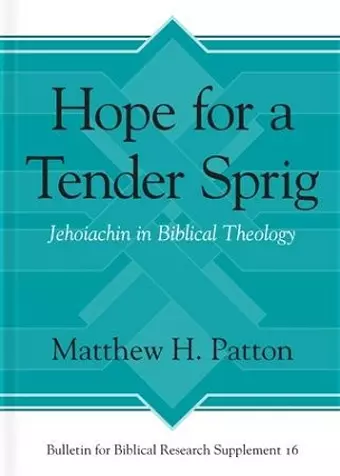Hope for a Tender Sprig
Jehoiachin in Biblical Theology
Format:Hardback
Publisher:Pennsylvania State University Press
Published:6th Feb '17
Currently unavailable, and unfortunately no date known when it will be back

Jehoiachin reigned a mere three months before Nebuchadnezzar took him into exile. He was one more Judean king who did evil in the eyes of Yahweh, and his one recorded action as king was to surrender to the Babylonians. How significant can a king be whose reign ended when it had scarcely begun? Remarkably, unlike his uncles, Jehoahaz and Zedekiah, Jehoiachin did not disappear after his removal. Instead, he became the focus of ongoing prophetic discussion about the monarchy, his rehabilitation by Evil-Merodach was a turning point in the exile, and his offspring was eventually identified as the future of David’s line. The attention paid to Jehoiachin in the canon is the seed of Patton’s study. Why is there such interest in a king who was so insignificant politically and who—literarily speaking—is a rather flat character? What significance do particular biblical books attribute to him, and why?
If we expand our purview to the Bible as a whole, another reason for investigating Jehoiachin emerges. The exile was one of the most significant events in the history of Israel. In its midst, Jehoiachin occupies an important position as both one of the last kings of Judah and one of the first exiles. Are there ways in which biblical writers capitalize on Jehoiachin’s unique position for their broader theological purposes?
Going one step further, in Hope for a Tender Sprig, Patton pursues not only the diversity of the Bible but also its unity, suggesting that “salvation history” is useful for conceiving the unity of the Bible, especially when we are concerned with a historical figure such as Jehoiachin. If the various books of the Bible bear witness to one grand storyline, what is the significance of Jehoiachin within that story? In the light of the canon as a whole, can we synthesize the various perspectives on Jehoiachin and articulate his distinctive role in this grand narrative?
These questions beg many others. What do we mean by “canon”? What grounds do we have for considering the canon as a unity, and why should we consider “salvation history” a valid paradigm for understanding it as a whole? What is the relationship of salvation history to “real” history, and is this even a valid question? What role will extrabiblical evidence (some of which...
“A worthy contribution to OT scholarship on Jehoiachin and biblical theology of salvation history. Though the author may overstate the significance of Jehoiachin, the exegetical work displayed throughout and the trajectory these passages provide in salvation history are valuable. This reader will incorporate many insights from this book into both teaching and preaching.”
—Dean M. Erickson Journal of the Evangelical Theological Society
“Readers interested in a biblical theology of exile or in seeing how a biblical character may take on significant reverberations throughout the biblical text will find this work interesting and insightful.”
—Benjamin J. M. Johnson Bulletin for Biblical Research
“Patton’s work is an important contribution to the study of the significance of Jehoiachin in biblical theology. The presentation of the biblical data (except for Isaiah) is first rate and demonstrates that Jehoiachin was not just a diminutive figure of Judah’s decline but also the one prophetically marked out as the carrier of divine promises of the nation’s future restoration.”
—George Athas Review of Biblical Literature
ISBN: 9781575064772
Dimensions: 229mm x 152mm x 25mm
Weight: 544g
272 pages